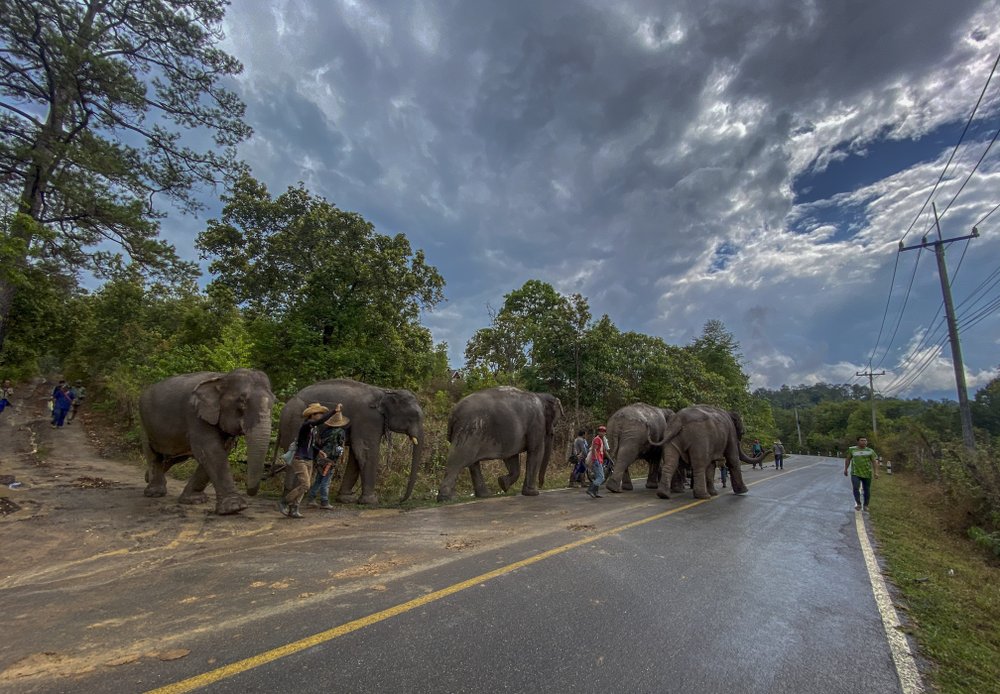BANGKOK (AP) — Thailand elephants are returning home to the wild after being “laid off” thanks to the coronavirus pandemic.

The millions of unemployed in Thailand due to COVID-19 include elephants dependent on tourists to feed their voracious appetites. With scant numbers of foreign visitors, commercial elephant camps and sanctuaries lack funds for their upkeep and have sent more than 100 of the animals trudging as far as 150 kilometres back to their homes.
The Save Elephant Foundation in the northern province of Chiang Mai has been promoting the elephants’ return to the greener pastures of home. The foundation supports fundraising appeals to feed animals still housed at tourist parks, but also believes it is good for them to return to their natural habitat where they can be more self-sufficient.
The situation is critical. London-based World Animal Protection says as many as 2,000 tame elephants are at risk of starvation because their owners are unable to feed them.
Since last month, more than 100 of the animals have marched from all over Chiang Mai to their homeland of Mae Chaem, which is dotted with villages where members of the Karen ethnic minority live and traditionally keep elephants.
Save Elephant’s founder, Saengduean Chailert, said the project to bring unemployed elephants home was launched in response to appeals from their owners.

Her group promotes settling elephants where they can live alongside villagers in sustainable eco-friendly communities. It believes the animals are abused at many high-profile tourist attractions.

Get daily National news
Sadudee Serichevee owns four elephants in Chiang Mai’s Mae Wang district. He followed the foundation’s approach in setting up his own small Karen Elephant Experience park with elephants brought from Mae Chaem’s Ban Huay Bong, his wife’s village.
But his good intentions were no match for the coronavirus.
“At first I thought the situation would be back to normal within a month or two. At the end of April, I lost all hope,” Sadudee said.
He and his wife agreed to bring their elephants back to her village because they could no longer shoulder the monthly expenses of close to 200,000 baht (CA$8,648) for rental of land and facilities, salaries for handlers — known as mahouts — and food. Elephants eat as much as 660 pounds a day of grass and vegetables.
They convinced some other owners to make the 150-kilometre trek on foot with them. Trucking the animals is prohibitively expensive for owners of small parks, and elephants can maintain a walking speed of 7.25 kilometres per hour.

Their caravan of 11 elephants, their owners and their mahouts, set out on April 30, travelling over hills, on paved and dirt roads. They were greeted by a welcome-home party on their arrival at Ban Huay Bong on Monday.
“These elephants have not had a chance to return home for 20 years. They seem to be very happy when arriving home, they make their happy noises, they run to the creek near the village and have fun along with our children,” Sadudee said.
The project is also active in the northeastern province of Surin, famous for its annual elephant festival. The province’s Tha Tum district, home to hundreds of elephants, welcomed about 40 of them back last month.
“We don’t know when COVID-19 will go away,” Save Elephant’s Saengduean said. “So this is our task, to help feed the elephants that were laid off because of the outbreak.”
—
Questions about COVID-19? Here are some things you need to know:
- Teen who desperately needed size 23 shoes now holds 2 world records
- Canada abstains from UN motion calling on Israel to end presence of Gaza, West Bank
- U.S. sues owner of ship that caused Baltimore bridge collapse for US$100M
- Iranian hackers tried to send stolen Trump info to Biden campaign, FBI says
Health officials caution against all international travel. Returning travellers are legally obligated to self-isolate for 14 days, beginning March 26, in case they develop symptoms and to prevent spreading the virus to others. Some provinces and territories have also implemented additional recommendations or enforcement measures to ensure those returning to the area self-isolate.
Symptoms can include fever, cough and difficulty breathing — very similar to a cold or flu. Some people can develop a more severe illness. People most at risk of this include older adults and people with severe chronic medical conditions like heart, lung or kidney disease. If you develop symptoms, contact public health authorities.
To prevent the virus from spreading, experts recommend frequent handwashing and coughing into your sleeve. They also recommend minimizing contact with others, staying home as much as possible and maintaining a distance of two metres from other people if you go out.
For full COVID-19 coverage from Global News, click here.
—








Comments